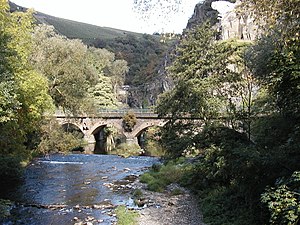| Ahr | |
|---|---|
 In the valley of the Ahr | |
 The river Ahr | |
| Etymology | Old High German aha ("water") |
| Location | |
| Country | Germany |
| Physical characteristics | |
| Source | |
| • location | Blankenheim, Northern Eifel, North Rhine-Westfalia, Germany |
| • coordinates | 50°26′17″N 6°38′58″E / 50.438°N 6.6494°E |
| • elevation | 470 m (1,540 ft) |
| Mouth | Rhine |
• location | Remagen, Rhineland-Palatinate, Germany |
• coordinates | 50°33′34″N 7°16′37″E / 50.55944°N 7.27694°E |
• elevation | 58 m (190 ft) |
| Length | 89 km (55 mi) |
| Basin size | 900 km2 (350 sq mi) |
| Discharge | |
| • average | 8.9 m3/s (310 cu ft/s) |
| Basin features | |
| Progression | Rhine→ North Sea |
Ahr (German pronunciation: [ˈaːɐ̯]) is a river in Germany, a left tributary of the Rhine. Its source is at an elevation of approximately 470 metres (1,540 ft) above sea level in Blankenheim in the Eifel, in the cellar of a timber-frame house near the castle of Blankenheim. After 18 kilometres (11 mi) it crosses from North Rhine-Westphalia into Rhineland-Palatinate.
The Ahr flows through Ahr valley or Ahrtal, passing through the towns of Schuld, Altenahr and Bad Neuenahr-Ahrweiler. Between Remagen and Sinzig (south of Bonn), at about 50 metres (160 ft) above sea level, it flows into the Rhine. The length is roughly 89 kilometres (55 mi), of which 68 kilometres (42 mi) is within Rhineland-Palatinate. The Ahr has a gradient of 0.4 percent in its lower course, and 0.4 to 0.8 percent in its upper course.

The Ahr and its tributaries are a main drainage system of the eastern Eifel. The watershed is approximately 900 square kilometres (350 sq mi).